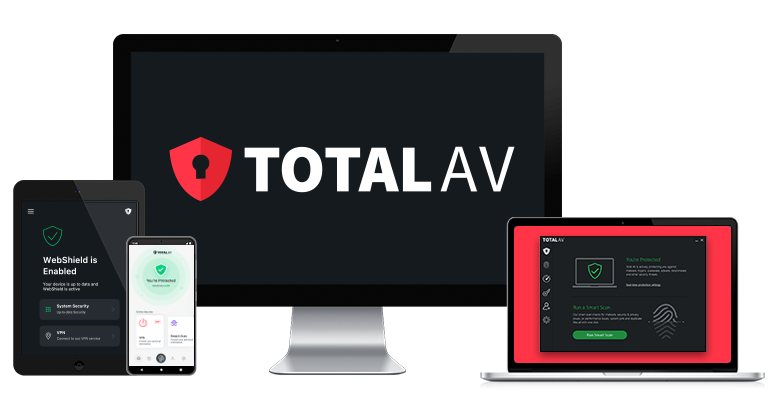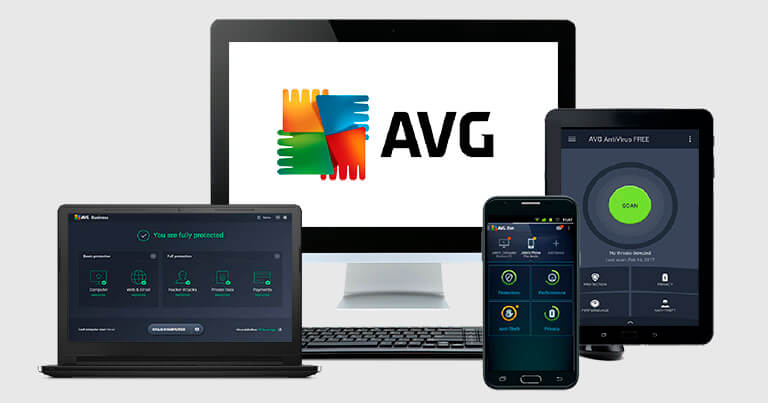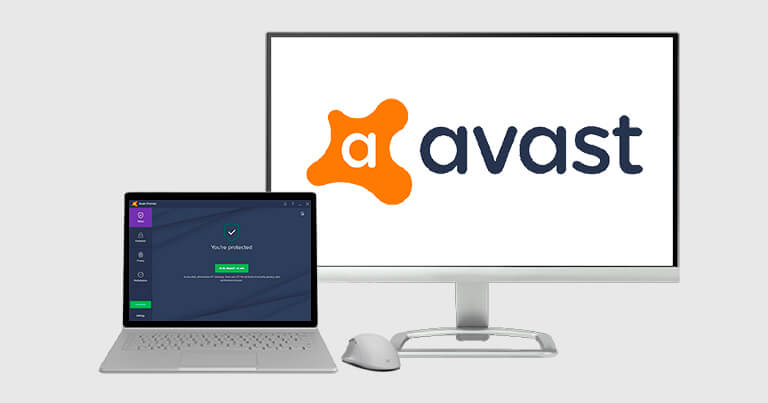
Updated on: November 8, 2024
Short on time? Here’s the best antivirus with email protection:
- 🥇 Norton : Thoroughly scans your incoming email for spam, infected attachments, and phishing links — removing anything harmful before it even hits your inbox. Also includes excellent malware scanning capabilities, web protection, identity theft monitoring, and more.
With suspicious emails constantly appearing in my inbox, I realized I needed better email protection. I began testing a range of antiviruses to find the best ones to keep me protected.
I was looking for antiviruses able to automatically detect and remove suspicious spam mail and protect me against malware hidden inside seemingly normal-looking links and email attachments. I also wanted to know that, should I accidentally click a malicious link in an email, my devices would be protected from harm.
Unfortunately, many of the antiviruses I tested simply didn’t live up to their claims, but there were some standout choices that offered in-depth email scanning and real-time protection against online threats.
I’ve come up with a list of the 7 best antiviruses for email protection. While Norton 360 is my #1 recommendation, every antivirus on this list will give you significantly more security than your email provider’s built-in protections.
Quick Summary of the Best Antiviruses With Email Protection in 2024
🥇 1. Norton — Best Overall Antivirus for Email Protection
Norton thoroughly scans incoming emails for infected attachments and safely removes them before they can do any damage. When I tested Norton’s email protection by sending test malware to my account, the infected files were detected and deleted before they were even downloaded to my inbox. For Outlook users, Norton also offers an AntiSpam feature that uses local filters to determine if a message is spam and places it in a junk folder if so.
Norton is also the best antivirus out there when it comes to adapting to new phishing scams and malware. It keeps its malware directory up to date with thousands of known malware items and uses machine learning to recognize new threats and keep you as secure as possible. Even though Norton can’t scan emails received via encrypted email service, Norton’s Auto-Protect feature will detect and remove any threats when you try to open them. Auto-Protect worked flawlessly when I tested it on my Gmail account.
Other features Norton offers include:
- Smart Firewall.
- Privacy protection.
- Ransomware protection.
- VPN (virtual private network).
- Secure Browser.
- Parental controls.
- ID protection package (limited protections outside of the US).
- Up to 250 GB of cloud storage with LifeLock plans.
- And much more…
Norton also offers a separate product called Safe Email that enables you to add up to 5 email addresses to be protected against malware and scams. It’s very simple to set up (literally requires just 4 clicks) and use, and it worked really well in my tests.
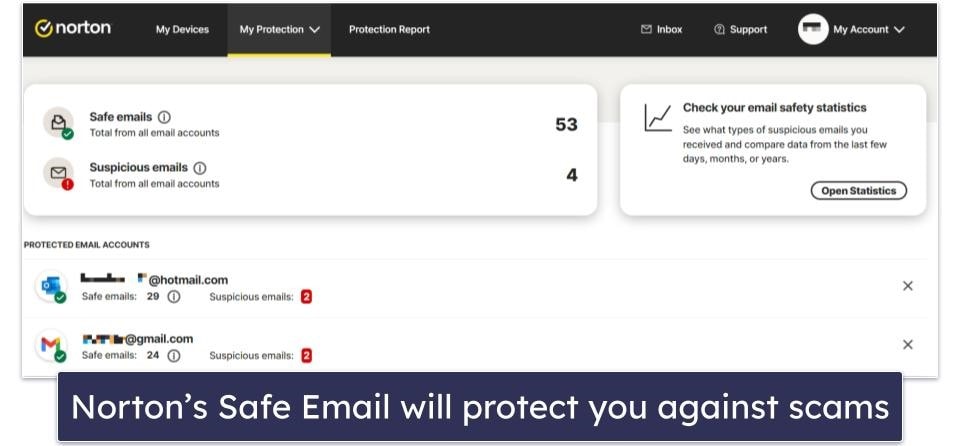
I’m also a big fan of Norton’s built-in Smart Firewall, which is essential for protecting your network. The Smart Firewall is a big improvement on the built-in firewalls of Windows and macOS, and in my tests, it detected a few exploits that my Windows firewall failed to block. There are also tons of settings for more advanced users to customize their experience — things like setting access and traffic rules for different programs on your PC.
Norton’s Secure Browser is easy to use, with features like Privacy Guard and Web Shield which block ads and malicious sites effectively. However, the Extension Guard was a bit disappointing, blocking almost all the extensions I tried to test it with. That being said, I really like that it’s easy to change privacy and security settings from its centralized dashboard.
Norton has a range of plans that start at $54.99 / year* and are backed by a generous 60-day money-back guarantee. My favorite plan, Norton 360 Deluxe, costs $49.99 / year* and includes email protection (but not Safe Email, which is a standalone product), malware and web protections, parental controls, 50 GB of cloud storage, and dark web monitoring for up to 5 devices. If you’re in the US, it’s worth considering Norton’s LifeLock plans, which include identity theft protection and insurance coverage of up to $1 million if you’re the victim of identity theft.
Bottom Line:
Norton offers unmatched email protection. It’s great at detecting malicious files and links, and it uses machine learning to identify and block new threats as they happen. It may be a little more expensive than some others on this list, but standout features like Safe Email (separate purchase), cloud storage, parental controls, and comprehensive identity theft protection (for users in select countries) make it a great value overall. You can try Norton for 60 days risk-free and make sure it’s right for you.
🥈 2. Bitdefender — Excellent Real-Time Protection Against Email Threats
Bitdefender is great for protecting your emails from malware and malicious links. Bitdefender Shield, its real-time protection tool, scans all emails you receive to continuously protect you from email-based malware threats. Bitdefender Shield successfully detected all the malicious email samples I sent to my inbox during testing.
In addition to that, Bitdefender includes Email Protection, which will scan your Gmail and Outlook inboxes and flag any suspicious emails. It’s easy to set up, and once you’ve enabled it, you can manage your inboxes (up to 5 of them) directly from Bitdefender’s user interface. My only complaint is that while email flagging works great in web browsers, it’s not as reliable in mail apps.
Bitdefender also has great antispam capabilities to prevent your inbox from getting clogged with junk. However, the antispam is only available for Outlook and Thunderbird email accounts.
Similar to Norton, Bitdefender’s anti-malware engine uses a large malware directory and machine learning to achieve perfect malware detection rates. I also really like how Bitdefender uses cloud-based scanning, so it hardly affects system processing power during scans.
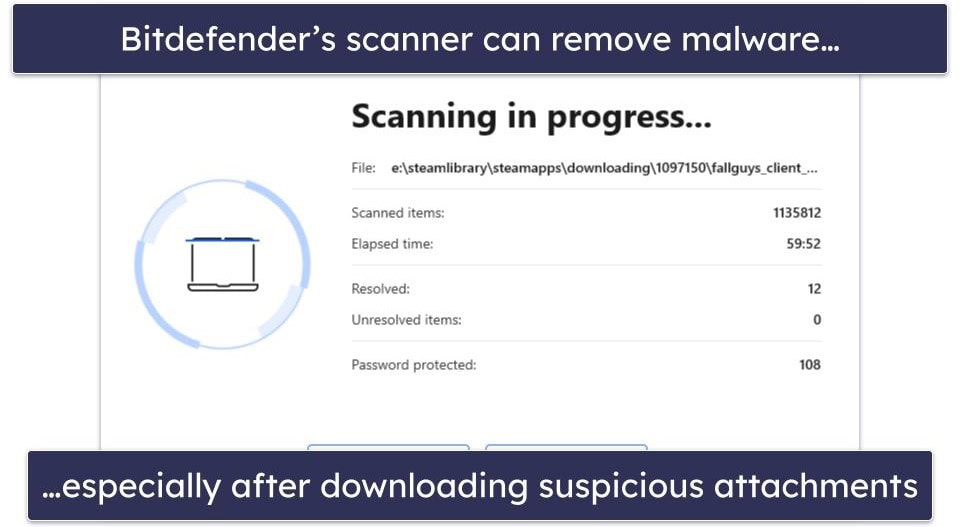
Some other features Bitdefender offers include:
- Anti-phishing protection.
- Secure browser.
- System optimization.
- Password manager.
- VPN (200 MB/day).
- Parental controls.
- Identity theft protection (US only).
- Plus a lot more…
I like Safepay, Bitdefender’s secure browser, which protects your data while you pay for things online. It does this by blocking screenshots, giving you a virtual keyboard so your keystrokes can’t be tracked, and automatically turning on Bitdefender’s VPN protection to keep your connection private. This is a really helpful extra layer of protection for your online transactions, and it worked perfectly in my tests.
I’m also a fan of Bitdefender’s VPN, which is super fast and good for torrenting. However, it’s annoying that you’re restricted to 200 MB per day on all but the most expensive plan, Premium Security, which includes all of Bitdefender’s features for $63.99 / year — Norton offers its VPN with unlimited data on all its plans.
All of Bitdefender’s plans offer great value for the price, starting at just $24.99 / year. My favorite plan is Bitdefender Total Security — it’s priced at $40.99 / year and offers coverage for up to 5 Windows, Mac, iOS, and Android devices. Bitdefender’s entry-level Antivirus Plus plan is priced at $24.99 / year and protects 1 Windows device. The Internet Security package costs $37.99 / year and includes protection for up to 3 Windows devices. All of Bitdefender’s packages come with a 30-day money-back guarantee.
Bottom line:
Bitdefender’s real-time protection tool, Bitdefender Shield, does a great job at protecting your emails and removing threats as they come into your inbox. It also includes Email Protection, a lightweight cloud-based scanner, a firewall, and the Safepay browser to keep your online purchases secure. Bitdefender is very reasonably priced compared to many other antiviruses and comes with a 30-day money-back guarantee.
Read the full Bitdefender review
🥉3. TotalAV — Beginner-Friendly With Excellent Real-Time Protection
TotalAV is a simple antivirus that’s easy to use, so it’s a great choice for less technical users. It doesn’t have a dedicated email scanner like Norton and the other products on my list, so it doesn’t scan your emails. However, its real-time malware protection is excellent, so it will scan the files downloaded to your inbox when you attempt to open them and protect you from anything malicious before you get a chance to download it to your device.
TotalAV has a good range of additional features, including:
- Web Shield.
- VPN (unlimited data).
- System cleanup tools.
- Password manager.
- Data breach monitoring.
- ID theft protection (US only).
- And more…

The Web Shield tool is really helpful for blocking phishing sites. It did well in my tests, blocking most malicious sites. However, while it’s better than what most competitors offer, I think Norton’s anti-phishing tools are even more advanced and user-friendly.
TotalAV also comes with a virtual private network. Its VPN is probably my favorite antivirus-bundled VPN in 2024 — it provides advanced features like leak protection, a kill switch, 256-bit AES encryption, and servers in 30+ countries around the world. TotalAV worked for streaming in my testing, too.
You’ll find an intuitive user interface, too. All of its features are easily accessed from its desktop app, and you can get to each feature’s settings with only one or two clicks. Other competitors split their features across online and desktop interfaces, and it can sometimes be frustrating to try and adjust settings for additional features, but TotalAV doesn’t have these problems.
TotalAV has several plans, but the Internet Security package offers the best overall protection. It provides all of TotalAV’s security features for up to 6 devices, as well as an unlimited-data VPN. TotalAV Internet Security only costs $39.00 / year, making it one of the most affordable antiviruses on this list.
Bottom Line:
TotalAV is a great choice if you’re looking for a simple, intuitive antivirus. It doesn’t have specific email protection like the other products on my list, but thanks to its great real-time protection and anti-phishing protection, TotalAV protects you from any malicious threats to your device. All TotalAV’s plans come with a 30-day money-back guarantee, so you can try it risk-free.
4. Avira — Good Mail Protection and Minimal System Impact
Avira’s Mail Protection feature will automatically scan your incoming emails for viruses and unwanted programs and remove threats before you open them. You can also set it to scan your outgoing emails too — sometimes viruses can attach themselves to emails with the goal of spreading, so the outgoing email scan can give you peace of mind knowing that you’re not accidentally sending malware.
In my tests, Avira’s Mail Protection successfully detected and removed all the test malware I emailed to my inbox. Even without Mail Protection enabled, Avira’s real-time protection does a great job of scanning any file you use, copy, or access, and preventing anything harmful from executing on your device, including anything you access via email.
Avira’s malware scanner is pretty great too — so great in fact that it gets licensed out to other major competitors, like TotalAV. Just like Bitdefender, Avira uses cloud server technology as part of its malware detection system, which means it places less stress on system resources and provides more accurate detection.
Avira also includes features such as:
- Firewall.
- Password manager.
- Web protection.
- Performance optimization tools.
- VPN.
- Game booster.
- And more…
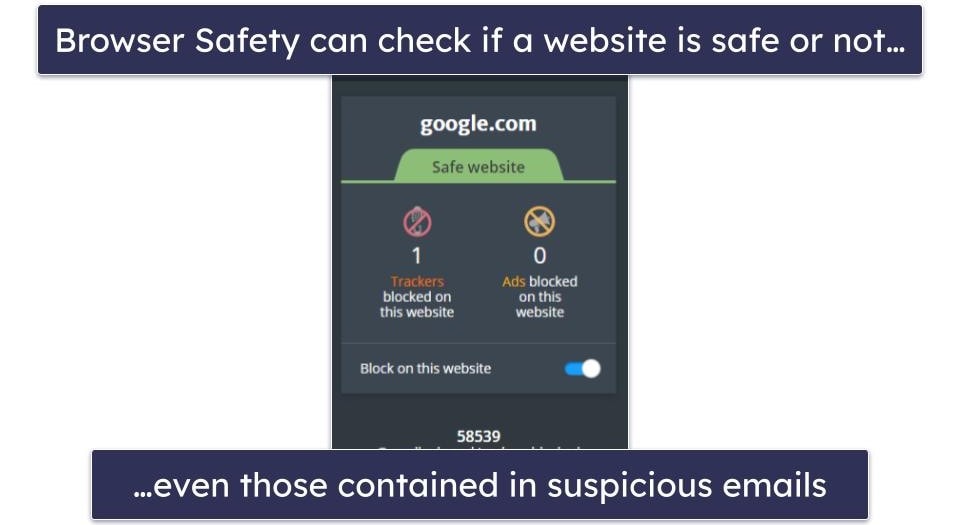
I like Avira’s Browser Safety web extension, which is pretty great at blocking phishing sites, ads, and trackers. In my tests, Avira blocked several phishing sites that Chrome and Firefox’s built-in protections missed. That said, its exploit protection wasn’t great, especially compared to Norton and Bitdefender.
I’m also a big fan of Avira’s password manager — it’s intuitive, secure, and most of its features are available on the free plan. All in all, it’s one of the best antivirus-bundled password managers out there.
Avira has a range of plans, but the Prime package ($59.99 / year) is the best deal, offering coverage for up to 5 devices and including features like email protection, a junk and registry cleaner, a performance optimizer, and an unlimited VPN. All Avira plans come with a generous 60-day money-back guarantee.
Bottom Line:
Avira provides good email protection and real-time protection, which ensures you’re safe from email-based malware and phishing scams. Its malware scanner works through the cloud to reduce stress on your system and has great malware detection rates. Avira also has a Secure Browser that is great at blocking phishing sites and ads. All of Avira’s plans come with a 60-day money-back guarantee.
5. Kaspersky — Highly Customizable Email Scanning
Kaspersky’s Mail Anti-Virus automatically scans your emails for dangerous files and links. It also comes with a variety of security customization options. When I tested it, I used the Optimal security level, which scans all incoming and outgoing messages and performs heuristic analysis on them with a medium level of detail. If you’re concerned about your email security, you can choose the Extreme security level, which performs very detailed deep scans on every incoming and outgoing message.
During each test, Kaspersky was able to identify all the threat samples I threw at it. It detected and disinfected each threat so I could safely access the messages. In cases where Kaspersky can’t successfully disinfect an email, it deletes it and places a copy into quarantine. Kaspersky’s Anti-Spam feature is pretty good, too, offering strong protection against annoying unsolicited emails. Again, it’s customizable, but the Optimal setting should be all most users need.
Kaspersky offers a range of additional features, including:
- Firewall.
- VPN (with unlimited data).
- Rescue Disk.
- Secure browser.
- Parental controls.
- Password manager.
- System cleanup tools.
- And more…
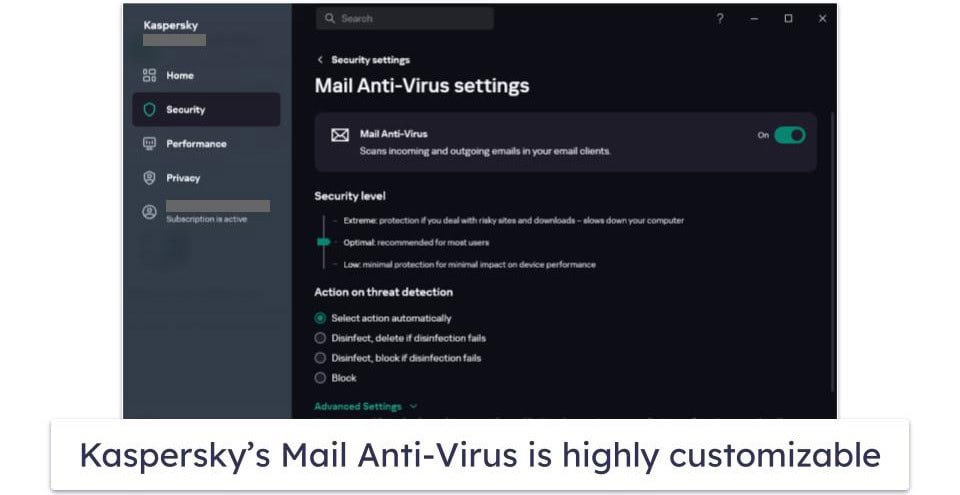
Kaspersky’s web protection is pretty good. Its Web Anti-Virus tool works with the Kaspersky Protection browser extension to check links for suspicious behavior and keep you protected in real-time. It’s excellent at detecting phishing scams — I put the anti-phishing protection to the test by sending myself some popular phishing scam emails, and Kaspersky blocked almost all of them. It didn’t perform quite as well as Norton, which blocked 100% of my test phishing scams, but I was still pretty impressed.
Kaspersky has 3 plans, but the Premium package offers the best value. For $38.99 / year, it includes every security feature offered by Kaspersky, including 1 year of free parental controls, on up to 20 devices. Every Kaspersky plan is covered by a risk-free 30-day money-back guarantee. Unfortunately, customers in the US can’t currently purchase Kaspersky due to regulatory restrictions.
Bottom Line:
Kaspersky offers strong email protection, great malware detection, and multi-layered web protection to keep you safe from threats in real-time. It also includes helpful security features like parental controls, a VPN, and a firewall. While Kaspersky’s anti-phishing protection didn’t detect every single phishing scam, it’s still highly effective, and it’s still a good choice for keeping your emails safe. All Kaspersky plans come with a 30-day money-back guarantee.
Read the full Kaspersky review
6. AVG — Powerful Antivirus With Advanced Behavior-Based Protection
AVG is a great antivirus for those seeking comprehensive email protection. It safeguards your inbox from phishing attempts, malicious attachments, and spam through its email scanning feature, Email Shield. This is similar to Norton’s Safe Email, but unlike Safe Email, it’s included in all AVG plans — even the free one.
When I tested AVG’s email protection, I found it to be super effective, easily handling vast quantities of personal and work-related emails. AVG’s real-time protection will scan for and filter out harmful threats before they reach your inbox. It also provides helpful notifications to inform you why it blocked a certain email. What’s more, AVG consistently ranked high for its detection rates, speed, and efficiency. I put it through rigorous testing against a wide array of malware samples, including viruses, ransomware, and spyware. AVG impressively identified and neutralized nearly all threats. Its real-time protection also stands out, swiftly intercepting malicious emails and sending malicious attachments into quarantine.
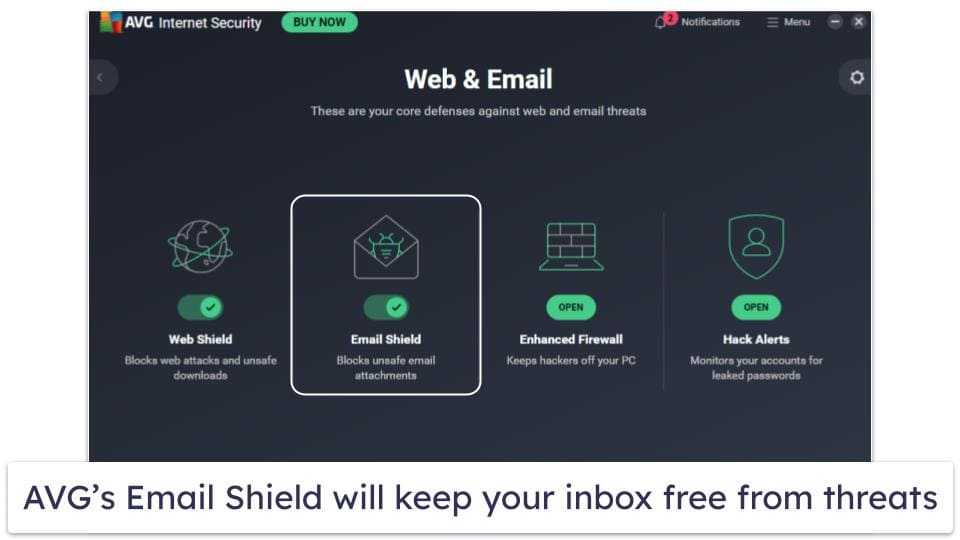
Beyond its excellent email protection, AVG comes packed with additional features. These include:
- Network security scanner.
- Firewall.
- Ransomware protection.
- Secure browser for safer online transactions.
- Device optimization tools.
- VPN.
- And more…
I really like AVG’s firewall. When I tested it, it effortlessly blocked incoming threats while intelligently managing outbound communications. This firewall actively monitors for suspicious activities and neutralizes potential threats before they can cause any harm. Moreover, I appreciate how it integrates seamlessly with AVG’s other security features and how customizable it is. You can choose among 4 modes of handling new apps and block individual apps with a single click.
AVG’s plans include a free version that offers essential protection, as well as 2 premium versions that provide better security, including advanced features like a remote access shield and an enhanced firewall. At $39.99 / year, the best-value plan is AVG Ultimate, which covers 10 devices and comes with all of AVG’s features, including the VPN and system tuneup tools. A 30-day money-back guarantee applies to both paid plans.
Bottom Line:
AVG delivers powerful antivirus protection with an emphasis on safeguarding your emails. Its high performance in tests, coupled with a suite of additional features, makes it a reliable tool against a wide array of cyber threats. The advanced ransomware protection stands out, providing critical security for your personal files. Both AVG plans come with a 30-day money-back guarantee.
7. Avast — User-Friendly Antivirus With 100% Detection Rate
Avast is a solid choice for those looking for email protection. Its Email Guardian feature scans incoming emails, including attachments and links, to prevent malicious content from reaching your inbox.
In my tests, Avast’s Email Guardian worked well, but it occasionally marked legitimate emails as spam which required manual sorting. This sensitivity, while erring on the side of caution, meant I often found myself checking my spam folders. Despite this, I appreciated having Email Guardian installed — I felt a lot better as I often get emails from tons of different sources. Plus, I was happy to see that the integration with email clients (Gmail, Outlook, and a few less popular ones I tried it on, such as Yahoo, Yandex, and AOL) was perfectly smooth.
Avast’s malware scanner had a perfect detection score when I tested it. Moreover, the full system scan took under an hour, which is comparable to Norton’s 40 minutes. Avast also offers a whole range of other scanning options, such as Boot-Time Scan (scans files before your OC is fully loaded), Targeted Scan (scans specific folders or drives), custom scans, and more.
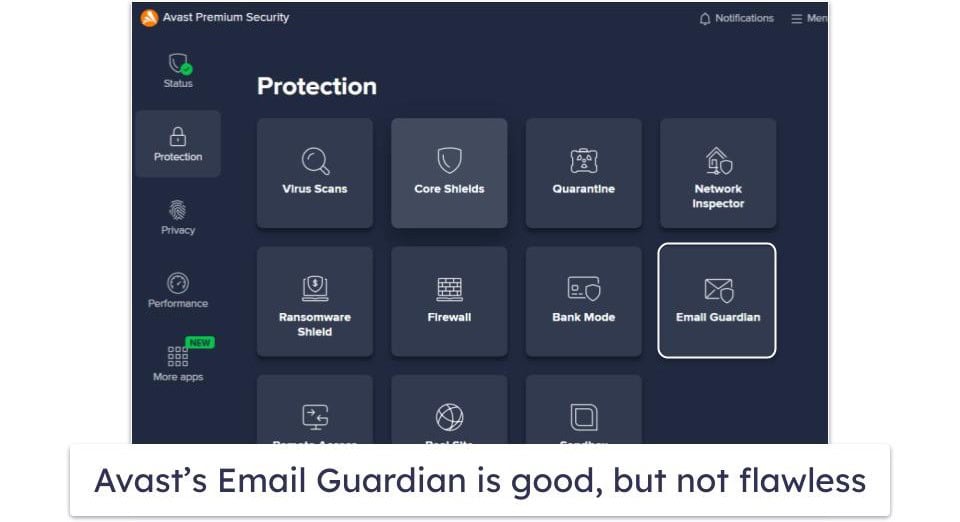
Avast also offers a broad range of security features:
- Real-time scanning.
- Secure browser
- Ransomware shield.
- Network Inspector.
- Firewall.
- Bank mode.
- And more…
I really like the Wi-Fi Inspector, which examines your network for security weaknesses. It’suseful for pinpointing vulnerabilities, but I found that its effectiveness can vary depending on the complexity of your network setup. In simpler home networks, it provides clear guidance for improvements, but in more complex setups, its advice is less actionable.
Regarding plans and pricing, Avast provides several plans across its Premium Security and Avast One packages. There’s a free version of Avast One, too, but I much prefer the paid options that offer comprehensive coverage, including web and email protection, firewall, webcam protection, app updater, and more. While there’s a lot of packages to choose from, between Premium Security and Avast One, I’d recommend the Avast One packages as the best for most users. For example, Avast One Gold costs $23.88 / year, can cover 5 or 30 devices, and comes with unlimited-data VPN, data breach monitoring, and all of the features discussed above.
Bottom Line:
Avast offers reliable email protection and a suite of security features aimed at keeping users safe from digital threats. Its performance is solid, with a few caveats around occasional false positives and the complexity of its more advanced features. The variety of its subscription models provides flexibility, though choosing the right plan can be a bit daunting. All plans are backed by a 30-day refund policy.
Quick Comparison Table
Testing Methodology: Comparison & Ranking Criteria
In comparing and assessing dozens of antiviruses to find the very best ones for email protection, I used our testing methodology:
- I looked for complete email security. It’s not every antivirus that scans and blocks malware from getting downloaded into your inbox. While a lot of antivirus software safeguards your device when files are being downloaded, leading brands such as Norton and Bitdefender go the extra mile by scanning every incoming email and preemptively blocking threats before they can even get to your inbox, guaranteeing thorough email protection.
- I looked for effective malware detection. I won’t even consider an antivirus for protecting my email and the rest of my online life unless it meets a 95%+ overall malware detection rate. Even one threat that slips through could seriously damage your machine and expose your data. All of the antiviruses on my list have very high malware detection rates.

- I tested real-time scanning capabilities. This is a must for any good antivirus. It should protect you consistently, not only during on-demand scans. All products on my list deliver top-tier real-time protection, neutralizing threats to your device and personal data, including those that come via email.
- I checked for anti-phishing protection. Anti-phishing protection is vital if you want to ensure your emails are fully protected, and I’m pleased to say that all the products on my list provide strong anti-phishing protections that block phishing sites. Norton 360 and Bitdefender in particular have flawless phishing detection rates.
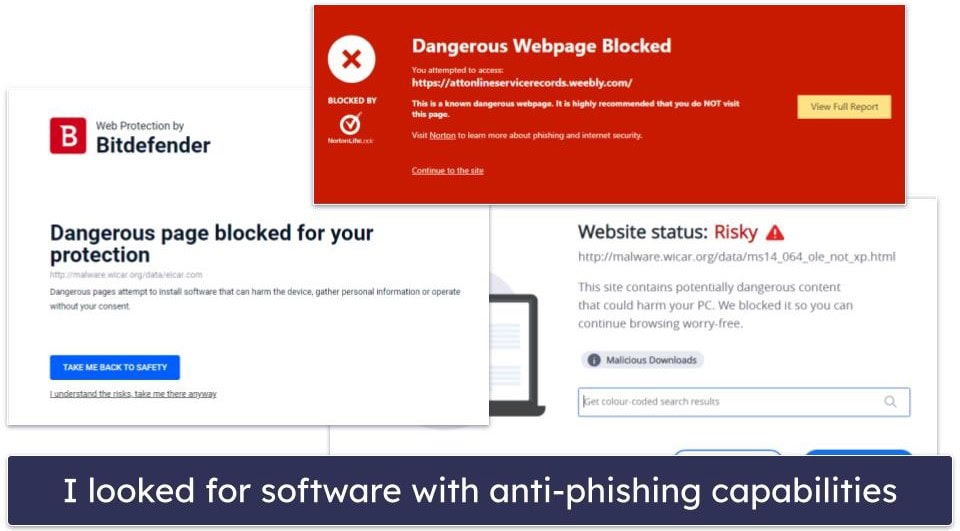
- I assessed overall value. You should consider antiviruses that offer excellent protection and additional features at a reasonable price. All the products on this list offer great value and come with money-back guarantees.
How Antivirus Software Protects Your Email From Malware
Antivirus software protects your inbox through several key features: real-time scanning, attachment analysis, phishing detection, and behavior monitoring.
- Real-time scanning. This is the antivirus’s first layer of defense, continuously checking incoming and outgoing emails for malware signatures. Malware signatures are unique identifiers, like digital fingerprints, for known malware. When an email arrives, the antivirus compares its contents against a database of these signatures. If a match is found, the email is flagged, and the user is alerted.
- Attachment analysis. Takes a closer look at the files included with your emails. Malware often hides within seemingly innocuous files, like PDFs or Word documents. Antivirus programs use sophisticated algorithms to inspect these attachments for malicious code or suspicious patterns, blocking those that pose a risk before they can be opened.
- Phishing detection. Focuses on the content of the email itself, identifying attempts to deceive the user into revealing sensitive information, such as passwords or credit card numbers. These emails often mimic those of legitimate companies or contacts. By analyzing the text and the source of the email, antivirus software can warn users about potential phishing attempts.
- Behavior monitoring. This is a more advanced technique for observing how files behave once opened. This is crucial for detecting zero-day threats and new forms of malware that haven’t been seen before. By monitoring unusual activities, such as attempts to access certain files or modify system settings without permission, antivirus software can identify and isolate potentially malicious behavior.
Together, these features provide comprehensive protection for your email, reducing the risk of malware infections. By employing good antivirus software, you can significantly bolster your cyber defenses against threats lurking in emails.
Top Brands That Didn’t Make the Cut
- McAfee. While McAfee has a ton of great features, like 100% malware detection and a strong firewall, it no longer offers anti-spam or email protection. That’s why McAfee lost its place on my list.
- Malwarebytes. Malwarebytes is a super-affordable but pretty bare-bones antivirus. It has a few useful security features, but it doesn’t offer any specific protection for your emails.
- Panda Dome. Panda is a decent antivirus, with reasonably priced plans and good malware protection. However, its email protection is not included in any of the plans for home users.
Frequently Asked Questions
How does email protection work?
When you receive a new email, an antivirus with email protection will scan it and remove files containing threats. It will be able to block threats before they even reach your inbox. A good antivirus will use heuristic analysis as well as a database of known threats to spot the most damaging malware or the trickiest phishing scams.
A lot of scams mask themselves as completely normal emails from friends, coworkers, or higher-ups in a company. They try to trick you into clicking links or downloading ransomware. By automatically scanning and removing these emails, the best antiviruses will keep you significantly safer.
What is the best way to protect my emails?
There are some basic safety measures you can take to stay safe when using email. You should never click on a link or attachment unless you’re sure it’s legitimate, and you should always exercise caution when you receive an email from an unfamiliar source. Even if the email is from a friend or work contact, it’s a good idea to check with them first if you’re not sure about the link or attachment, as it’s possible they might have been hacked.
But on top of these basic common-sense measures, it’s a great idea to invest in antivirus software with email protection, like Norton. This way, any threats will be neutralized before they even reach your inbox.
Does a free antivirus protect my emails?
I’ve never found a free antivirus that offers comprehensive email protection. Even the better free plans, like Avira Free Antivirus, don’t include email protection — to get this, you need to upgrade to a paid Avira plan
If email protection is important to you, you’re definitely better off investing a few bucks a month in a premium antivirus like Norton, which provides access to a full suite of security tools to protect your emails and everything else in your online life.
Does Avast protect email?
Yes, Avast has an email protection feature called Email Guardian that will protect your inbox from malicious links and attachments. It works well, although it can sometimes mark legitimate mail as spam. It integrates with a wide range of popular and less-known email clients.
Can viruses hack email?
Viruses cannot “hack” emails in the traditional sense of gaining unauthorized access to email accounts directly. However, they can install keyloggers on your device, which can then capture your email credentials. Moreover, ransomware can encrypt your data and lock you out of your systems, including email clients and servers. To protect your device and data, you should install a reliable antivirus solution with real-time and email protection.
